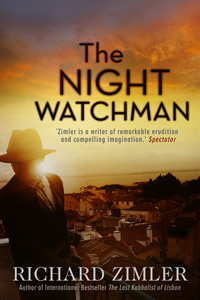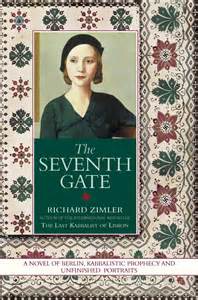 Chief Inspector Henrique Monroe of the Lisbon Police Department is brilliant at what he does, but gets help from a very unusual source. When a successful businessman is murdered under strange circumstances in his home, Monroe is called to investigate. The complex case awakens memories of Monroe’s distant past of growing up in Colorado with his younger brother Ernie, and threatens to unravel the fragile new reality the cop had been constructing around himself in Portugal ever since. His search for truth takes him to the country’s highest echelons of power. What he finds is horrifying, but tragically common. The Night Watchman portrays a troubled, corrupt society any South African reader will recognise. Tense, deeply felt, the novel asks a pivotal question: “Was it a paradox that truths left unspoken ended up taking away your voice?” The disquieting answers it provides are heart-breaking.
Chief Inspector Henrique Monroe of the Lisbon Police Department is brilliant at what he does, but gets help from a very unusual source. When a successful businessman is murdered under strange circumstances in his home, Monroe is called to investigate. The complex case awakens memories of Monroe’s distant past of growing up in Colorado with his younger brother Ernie, and threatens to unravel the fragile new reality the cop had been constructing around himself in Portugal ever since. His search for truth takes him to the country’s highest echelons of power. What he finds is horrifying, but tragically common. The Night Watchman portrays a troubled, corrupt society any South African reader will recognise. Tense, deeply felt, the novel asks a pivotal question: “Was it a paradox that truths left unspoken ended up taking away your voice?” The disquieting answers it provides are heart-breaking.
The Night Watchman
by Richard Zimler
Corsair, 2014
Book mark first published in the Cape Times on 12 December 2014.
In 2007, I reviewed one other novel by Richard Zimler:
 The Seventh Gate
The Seventh Gate
Constable, 2007
In 1990 the discovery of seven manuscripts of the sixteenth-century Kabbalist Berekiah Zarco sparked Richard Zimler’s internationally bestselling novel The Last Kabbalist of Lisbon (1996). Following its success, Zimler, an American living in Portugal, published two other novels about the Portuguese-Jewish Zarco family: Hunting Midnight (2003) and Guardian of the Dawn (2005).
The Last Kabbalist of Lisbon explores the fates of the Jewish community at the time of the Lisbon massacre of April 1506. Partly set in nineteenth-century Africa, Hunting Midnight is the story of a friendship between the Portuguese John Zarco Stewart and an African healer and freed slave named Midnight. Guardian of the Dawn takes us back to Goa at the time of the Catholic Inquisition in the seventeenth century.
The fourth novel in Zimler’s independent historical novels series is The Seventh Gate. Set in Berlin of the 1930s, it portrays Hitler’s brutal rise to power and the effects it had on the Jewish community and the disabled long before Second World War began. It subtly exposes how a whole nation could succumb to the madness of the Nazi regime; some willingly, others under extreme pressure. Meticulously researched and vividly brought to life, Zimler’s Berlin of the 1930s is a nightmarish place where loyalty between family members and friends as well as each individual’s sanity and heroism are tested to the limits.
In spite of its harrowing topic, The Seventh Gate is the kind of novel that makes you relax after the first twenty pages, knowing that there is another five hundred in store for you before the final curtain falls. Driven by superbly drawn characters, strong dialogues, and the unusual but beautifully touching love story at its centre, The Seventh Gate is a tribute to all the people who suffered similar fates at the hand of the Nazis as the characters in the novel.
The story is told by Sophie. In the Preface of the novel she is a fragile eighty-nine year old living in America and being taken care of by her nephew. After a spell in the hospital she decides to entrust him with her memories of the past when she was a teenage German girl in Berlin of the 30s and the world began to fall to pieces.
Sophie tells the story of Isaac Zarco, a descendant of the Kabbalist Berekiah Zarco, and the members of The Ring, now a clandestine group of Jewish activists trying to fight the Nazi regime. It is also the story of her brother Hansi, a distant child whom Sophie loves dearly and whose life is threatened by the Nazis. Misunderstood by her mother, betrayed by her father and Tonio, the boy she has a crush on, Sophie has to make some tough choices, trying to protect Hansi and her friends from the Nazi onslaught. The sudden wave of mysterious murders, disappearances and forced sterilizations makes her and Isaac realise that Berekiah Zarco’s worst fears might be about to come true, centuries after he wrote his manuscripts.
Artistically talented and mischievous, Sophie is a heroine one will not easily forget. Her passion for the cinema, her growing sense of righteousness, her awakening sexuality, and her selfless devotion to the people she loves sparkle with authenticity. The novel is interspersed with the poignant sketches she draws of her friends, adding to this overall effect.
Much has been written on Hitler’s Germany, but Zimler’s The Seventh Gate reveals a side of its inhumane machinery which has not been as prominent in the renderings of the time as it should have been, as the novel carefully examines how the horrors we associate with the time of the war already started happening in the early 30s with everyone watching almost in complete silence. Zimler probes the questions of how power is consolidated by intimidation and propagandistic lies, but also shows how small acts of courage and integrity can stand in its way. As Sophie comments on her younger self: “I’m still too young to know that people need only be frightened for their lives to swear that night is day. And that they can believe it’s really true.”
In an interview with Boyd Tonkin, Zimler stated that the relationship between the siblings Hansi and Sophie is his “monument” to the victims of the Nazi war on the disabled. The author expressed his wish that “every reader who reads the book with an open heart will be devastated by what happens to them both.” Because of the powerful storytelling of The Seventh Gate one cannot help but be.
Review first published in the Sunday Independent on 25 November 2007.